初中被动语态讲解及练习
- 格式:docx
- 大小:23.36 KB
- 文档页数:4
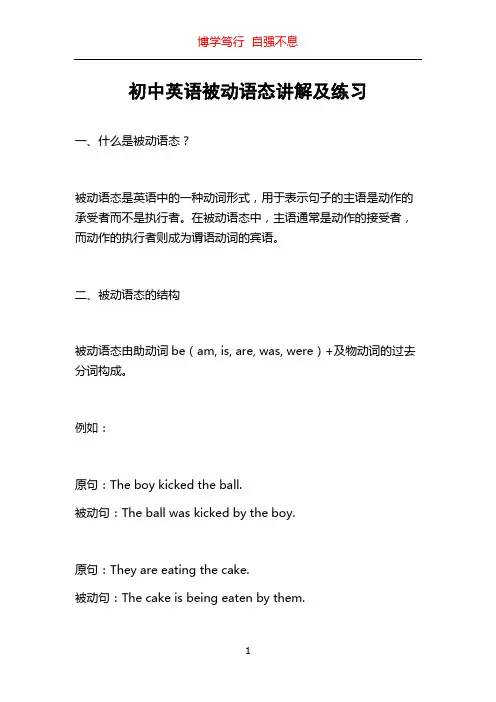
初中英语被动语态讲解及练习一、什么是被动语态?被动语态是英语中的一种动词形式,用于表示句子的主语是动作的承受者而不是执行者。
在被动语态中,主语通常是动作的接受者,而动作的执行者则成为谓语动词的宾语。
二、被动语态的结构被动语态由助动词be(am, is, are, was, were)+及物动词的过去分词构成。
例如:原句:The boy kicked the ball.被动句:The ball was kicked by the boy.原句:They are eating the cake.被动句:The cake is being eaten by them.三、被动语态的用法1. 当我们不知道或不关心动作的执行者是谁时,常常使用被动语态。
例如:The book was written in 2005.(这本书是2005年写的。
)The window has been broken.(窗户已经被打破了。
)2. 当动作的执行者已经知道或不需要强调时,可以使用被动语态。
例如:English is spoken all over the world.(英语在世界各地都被使用。
)The car was repaired by the mechanic.(这辆车是由机修工修理的。
)3. 当我们想要强调动作的接受者时,可以使用被动语态。
例如:The cake was eaten by Tom.(这块蛋糕是汤姆吃掉的。
)The book was read by all the students.(这本书被所有学生读过。
)四、被动语态的时态和语态转换1. 一般现在时的被动语态被动语态的一般现在时由am/is/are + 过去分词构成。
例如:原句:They build a house.(他们造了一座房子。
)被动句:A house is built by them.(一座房子被他们造了。
)2. 一般过去时的被动语态被动语态的一般过去时由was/were + 过去分词构成。
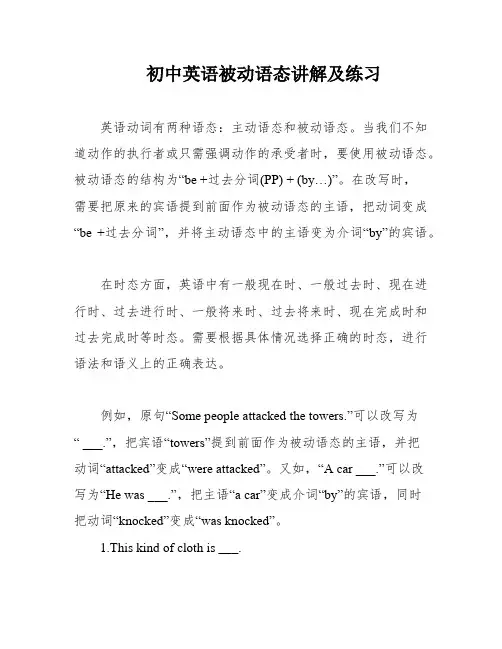
初中英语被动语态讲解及练习英语动词有两种语态:主动语态和被动语态。
当我们不知道动作的执行者或只需强调动作的承受者时,要使用被动语态。
被动语态的结构为“be +过去分词(PP) + (by…)”。
在改写时,需要把原来的宾语提到前面作为被动语态的主语,把动词变成“be +过去分词”,并将主动语态中的主语变为介词“by”的宾语。
在时态方面,英语中有一般现在时、一般过去时、现在进行时、过去进行时、一般将来时、过去将来时、现在完成时和过去完成时等时态。
需要根据具体情况选择正确的时态,进行语法和语义上的正确表达。
例如,原句“Some people attacked the towers.”可以改写为“ ___.”,把宾语“towers”提到前面作为被动语态的主语,并把动词“attacked”变成“were attacked”。
又如,“A car ___.”可以改写为“He was ___.”,把主语“a car”变成介词“by”的宾语,同时把动词“knocked”变成“was knocked”。
1.This kind of cloth is ___.2.When the infinitive is used as an adverb after certain adjectives and has a direct object。
it takes the active form to express passive meaning.Examples:The fish is not fit to eat.We find English hard to learn.The article is difficult to understand.3.When the infinitive is used as a postpositive attributive。
it takes the active form to express passive meaning.Examples:I have a lot of homework to do.I'll give him some books to read.4.When a ___ a state or n。
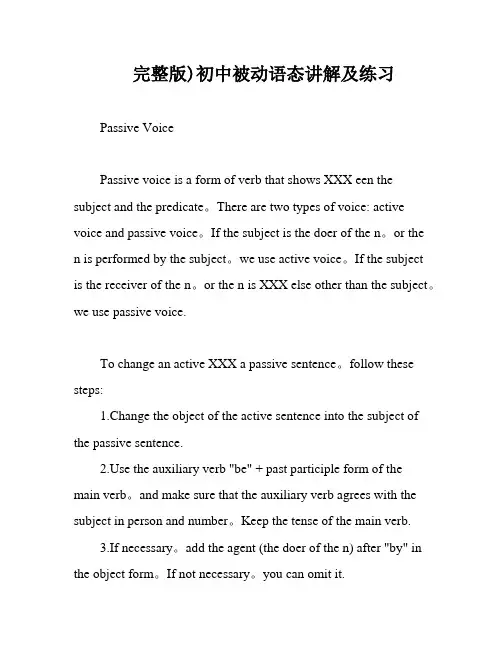
完整版)初中被动语态讲解及练习Passive VoicePassive voice is a form of verb that shows XXX een the subject and the predicate。
There are two types of voice: active voice and passive voice。
If the subject is the doer of the n。
or the n is performed by the subject。
we use active voice。
If the subjectis the receiver of the n。
or the n is XXX else other than the subject。
we use passive voice.To change an active XXX a passive sentence。
follow these steps:1.Change the object of the active sentence into the subject of the passive sentence.e the auxiliary verb "be" + past participle form of the main verb。
and make sure that the auxiliary verb agrees with the subject in person and number。
Keep the tense of the main verb.3.If necessary。
add the agent (the doer of the n) after "by" in the object form。
If not necessary。
you can omit it.4.Keep the other elements (adjectives。
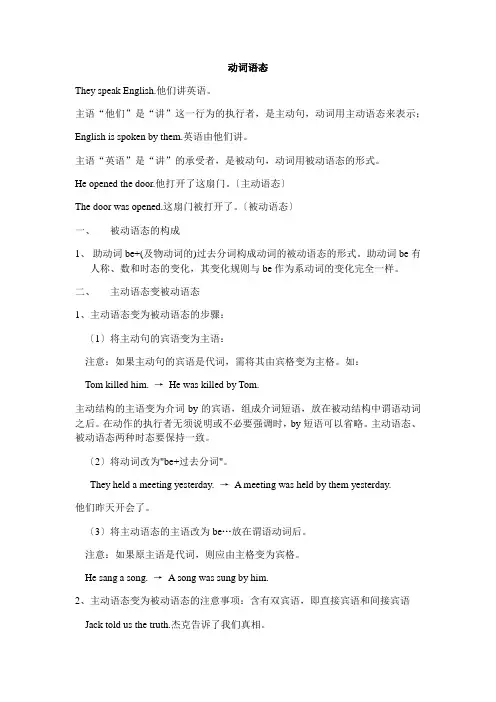
动词语态They speak English.他们讲英语。
主语“他们”是“讲”这一行为的执行者,是主动句,动词用主动语态来表示;English is spoken by them.英语由他们讲。
主语“英语”是“讲”的承受者,是被动句,动词用被动语态的形式。
He opened the door.他打开了这扇门。
〔主动语态〕The door was opened.这扇门被打开了。
〔被动语态〕一、被动语态的构成1、助动词be+(及物动词的)过去分词构成动词的被动语态的形式。
助动词be有人称、数和时态的变化,其变化规则与be作为系动词的变化完全一样。
二、主动语态变被动语态1、主动语态变为被动语态的步骤:〔1〕将主动句的宾语变为主语:注意:如果主动句的宾语是代词,需将其由宾格变为主格。
如:Tom killed him. →He was killed by Tom.主动结构的主语变为介词by的宾语,组成介词短语,放在被动结构中谓语动词之后。
在动作的执行者无须说明或不必要强调时,by短语可以省略。
主动语态、被动语态两种时态要保持一致。
〔2〕将动词改为"be+过去分词"。
They held a meeting yesterday. →A meeting was held by them yesterday.他们昨天开会了。
〔3〕将主动语态的主语改为be…放在谓语动词后。
注意:如果原主语是代词,则应由主格变为宾格。
He sang a song. → A song was sung by him.2、主动语态变为被动语态的注意事项:含有双宾语,即直接宾语和间接宾语Jack told us the truth.杰克告诉了我们真相。
We were told the truth by Jack. The truth was told (to) us by Jack.三、各种时态的被动语态1.一般现在时:am/is/are +过去分词We are taught English by her.由她教我们英语。
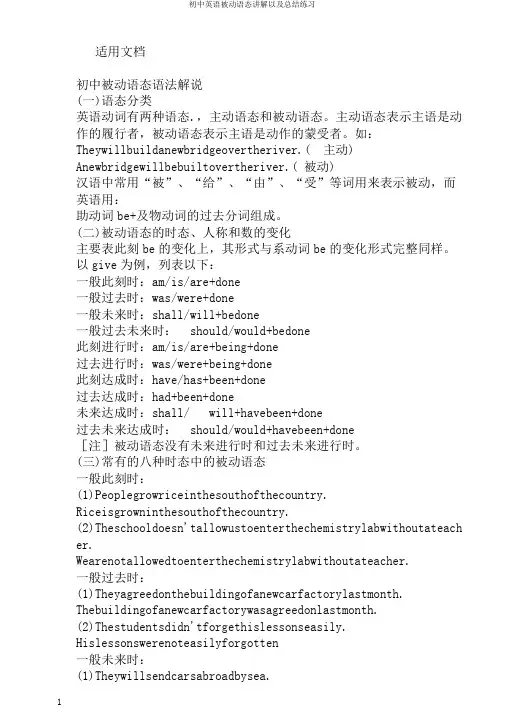
适用文档初中被动语态语法解说(一)语态分类英语动词有两种语态.,主动语态和被动语态。
主动语态表示主语是动作的履行者,被动语态表示主语是动作的蒙受者。
如:Theywillbuildanewbridgeovertheriver.( 主动) Anewbridgewillbebuiltovertheriver.( 被动)汉语中常用“被”、“给”、“由”、“受”等词用来表示被动,而英语用:助动词be+及物动词的过去分词组成。
(二)被动语态的时态、人称和数的变化主要表此刻be的变化上,其形式与系动词be的变化形式完整同样。
以give为例,列表以下:一般此刻时:am/is/are+done一般过去时:was/were+done一般未来时:shall/will+bedone一般过去未来时:should/would+bedone此刻进行时:am/is/are+being+done过去进行时:was/were+being+done此刻达成时:have/has+been+done过去达成时:had+been+done未来达成时:shall/ will+havebeen+done过去未来达成时:should/would+havebeen+done[注]被动语态没有未来进行时和过去未来进行时。
(三)常有的八种时态中的被动语态一般此刻时:(1)Peoplegrowriceinthesouthofthecountry. Riceisgrowninthesouthofthecountry.(2)Theschooldoesn'tallowustoenterthechemistrylabwithoutateach er. Wearenotallowedtoenterthechemistrylabwithoutateacher.一般过去时:(1)Theyagreedonthebuildingofanewcarfactorylastmonth. Thebuildingofanewcarfactorywasagreedonlastmonth.(2)Thestudentsdidn'tforgethislessonseasily. Hislessonswerenoteasilyforgotten一般未来时:(1)Theywillsendcarsabroadbysea.Carswillbesentabroadbysea.(2)Theywillgiveplentyofjobstoschool-leavers. Plentyofjobswillbegiventoschool-leavers.过去未来时:(1)Themanagersaidtheywouldcompletetheprojectbytheendoftheyear. Themanagersaidtheprojectwouldbecompletedbytheendoftheyear. Theworkerstoldmetheywouldmendthecarassoonaspossible.Theworker stoldmethatthecarwouldbemendedassoonaspossible.5.此刻进行时:文案大全适用文档(1)TheradioisbroadcastingEnglishlessons. Englishlessonsarebeingbroadcastedontheradio.Wearepaintingtherooms.Theroomsarebeingpainted.6.过去进行时:(1)Theworkersweremendingtheroad.Theroadwasbeingmended.(2)Thistimelastyearwewereplantingtreeshere. Treeswerebeingplantedherethistimelastyear.此刻达成时:(1)Someonehastoldmethesportsmeetingmightbeputoff. Ihavebeentoldthesportsmeetingmightbeputoff.(2)Hehasbroughthisbookhere.Hisbookhasbeenbroughthere.过去达成时:(1)WhenIgottothetheatre,Ifoundtheyhadalreadysoldoutthetickets. WhenIgottothetheatre,Ifoundtheticketshadalreadybeensoldout. Thewholecountrywasverysadatthenewsofhisdeath;Peoplehadconsideredhimtobeagreatleade r.Hehadbeenconsideredtobeagreatleader(四)含有神态动词的被动语态:含有神态动词的被动语态是由“神态动词+be+及物动词的过去分词”组成。
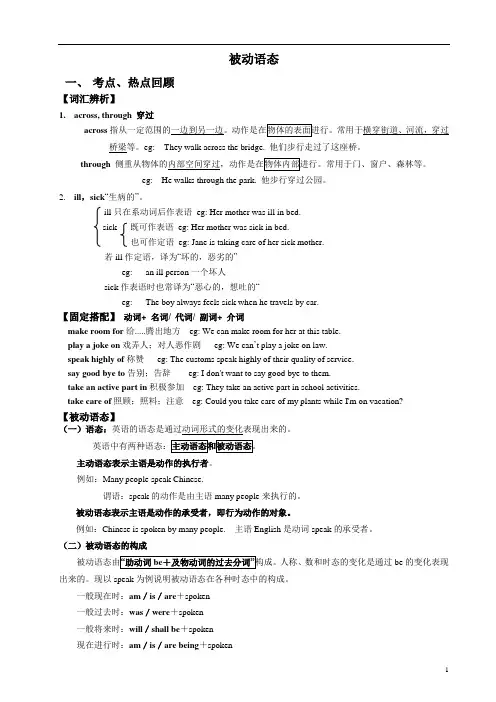
被动语态一、考点、热点回顾【词汇辨析】1.across, through 穿过across指从一定范围的一边到另一边。
动作是在物体的表面进行。
常用于横穿街道、河流,穿过桥梁等。
eg: They walk across the bridge. 他们步行走过了这座桥。
through 侧重从物体的内部空间穿过,动作是在物体内部进行。
常用于门、窗户、森林等。
eg: He walks through the park. 他步行穿过公园。
2.ill,sick“生病的”。
ill只在系动词后作表语eg: Her mother was ill in bed.sick 既可作表语eg: Her mother was sick in bed.也可作定语eg: Jane is taking care of her sick mother.若ill作定语,译为“坏的,恶劣的”eg: an ill person一个坏人sick作表语时也常译为“恶心的,想吐的“eg: The boy always feels sick when he travels by car.【固定搭配】动词+ 名词/ 代词/ 副词+ 介词make room for给.....腾出地方eg: We can make room for her at this table.play a joke on戏弄人;对人恶作剧eg: We can’t play a joke on law.speak highly of称赞eg: The customs speak highly of their quality of service.say good bye to告别;告辞eg:I don't want to say good bye to them.take an active part in积极参加eg: They take an active part in school activities.take care of照顾;照料;注意eg: Could you take care of my plants while I'm on vacation?【被动语态】(一)语态:英语的语态是通过动词形式的变化表现出来的。
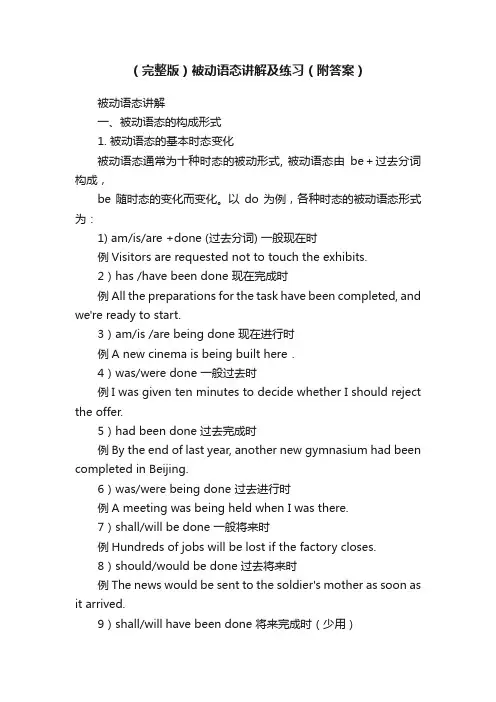
(完整版)被动语态讲解及练习(附答案)被动语态讲解一、被动语态的构成形式1. 被动语态的基本时态变化被动语态通常为十种时态的被动形式, 被动语态由be+过去分词构成,be随时态的变化而变化。
以do为例,各种时态的被动语态形式为:1) am/is/are +done (过去分词) 一般现在时例Visitors are requested not to touch the exhibits.2)has /have been done 现在完成时例All the preparations for the task have been completed, and we're ready to start.3)am/is /are being done 现在进行时例A new cinema is being built here.4)was/were done 一般过去时例I was given ten minutes to decide whether I should reject the offer.5)had been done 过去完成时例By the end of last year, another new gymnasium had been completed in Beijing.6)was/were being done 过去进行时例A meeting was being held when I was there.7)shall/will be done 一般将来时例Hundreds of jobs will be lost if the factory closes.8)should/would be done 过去将来时例The news would be sent to the soldier's mother as soon as it arrived.9)shall/will have been done 将来完成时(少用)例The project will have been completed before July.2. 被动语态的特殊结构形式1)带情态动词的被动结构。

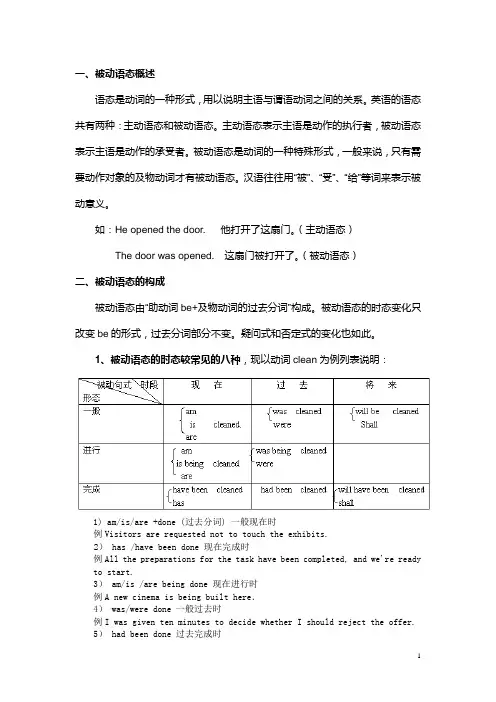
一、被动语态概述语态是动词的一种形式,用以说明主语与谓语动词之间的关系。
英语的语态共有两种:主动语态和被动语态。
主动语态表示主语是动作的执行者,被动语态表示主语是动作的承受者。
被动语态是动词的一种特殊形式,一般来说,只有需要动作对象的及物动词才有被动语态。
汉语往往用“被”、“受”、“给”等词来表示被动意义。
如:He opened the door.他打开了这扇门。
(主动语态)The door was opened.这扇门被打开了。
(被动语态)二、被动语态的构成被动语态由“助动词be+及物动词的过去分词”构成。
被动语态的时态变化只改变be的形式,过去分词部分不变。
疑问式和否定式的变化也如此。
1、被动语态的时态较常见的八种,现以动词clean为例列表说明:1) am/is/are +done (过去分词) 一般现在时例Visitors are requested not to touch the exhibits.2) has /have been done 现在完成时例All the preparations for the task have been completed, and we're ready to start.3) am/is /are being done 现在进行时例A new cinema is being built here.4) was/were done 一般过去时例I was given ten minutes to decide whether I should reject the offer.5) had been done 过去完成时例 By the end of last year, another new gymnasium had been completed in Beijing.6) was/were being done 过去进行时例A meeting was being held when I was there.7) shall/will be done 一般将来时例Hundreds of jobs will be lost if the factory closes.8) shall/will have been done 将来完成时例The project will have been completed before July.2、被动语态的句式变化:以一般现在时和动词invite为例,列表说明被动语态的句式变化:3、含有情态动词的被动语态情态动词的被动语态结构为:情态动词+be+过去分词;其时态及句型的变化仅由情态动词完成,“be+过去分词”部分不变。
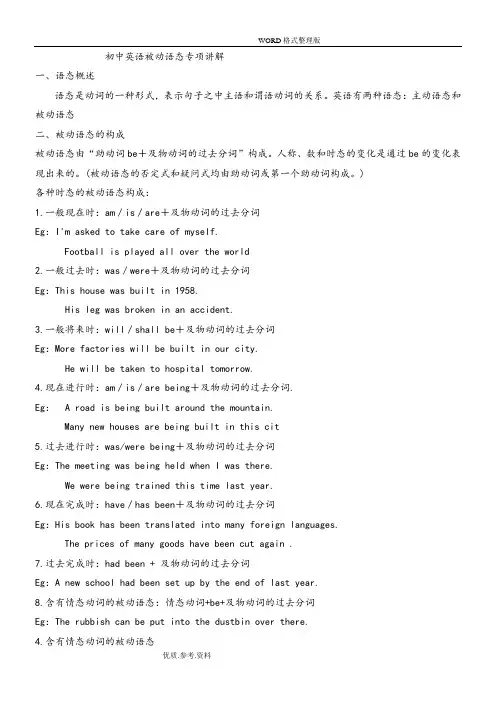
初中英语被动语态专项讲解一、语态概述语态是动词的一种形式,表示句子之中主语和谓语动词的关系。
英语有两种语态:主动语态和被动语态二、被动语态的构成被动语态由“助动词be+及物动词的过去分词”构成。
人称、数和时态的变化是通过be的变化表现出来的。
(被动语态的否定式和疑问式均由助动词或第一个助动词构成。
)各种时态的被动语态构成:1.一般现在时:am/is/are+及物动词的过去分词Eg:I'm asked to take care of myself.Football is played all over the world2.一般过去时:was/were+及物动词的过去分词Eg:This house was built in 1958.His leg was broken in an accident.3.一般将来时:will/shall be+及物动词的过去分词Eg:More factories will be built in our city.He will be taken to hospital tomorrow.4.现在进行时:am/is/are being+及物动词的过去分词.Eg: A road is being built around the mountain.Many new houses are being built in this cit5.过去进行时:was/were being+及物动词的过去分词Eg:The meeting was being held when I was there.We were being trained this time last year.6.现在完成时:have/has been+及物动词的过去分词Eg:His book has been translated into many foreign languages.The prices of many goods have been cut again .7.过去完成时:had been + 及物动词的过去分词Eg:A new school had been set up by the end of last year.8.含有情态动词的被动语态:情态动词+be+及物动词的过去分词Eg:The rubbish can be put into the dustbin over there.4.含有情态动词的被动语态含有情态动词的主动语态变成被动语态时,由“情态动词+be+过去分词”构成,原来带to的情态动词变成被动语态后“to”仍要保留。
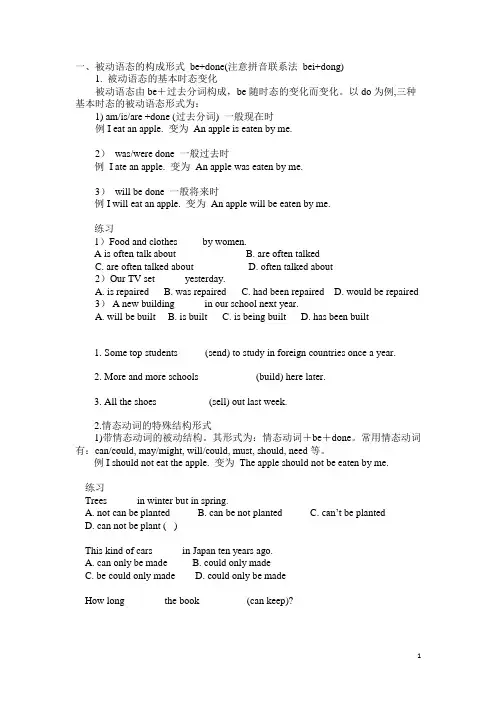
一、被动语态的构成形式be+done(注意拼音联系法bei+dong)1. 被动语态的基本时态变化被动语态由be+过去分词构成,be随时态的变化而变化。
以do为例,三种基本时态的被动语态形式为:1) am/is/are +done (过去分词) 一般现在时例I eat an apple. 变为An apple is eaten by me.2)was/were done 一般过去时例I ate an apple. 变为An apple was eaten by me.3)will be done 一般将来时例I will eat an apple. 变为An apple will be eaten by me.练习1)Food and clothes ____ by women.A is often talk about B. are often talkedC. are often talked aboutD. often talked about2)Our TV set _____ yesterday.A. is repairedB. was repairedC. had been repairedD. would be repaired3) A new building _____ in our school next year.A. will be builtB. is builtC. is being builtD. has been built1. Some top students _____(send) to study in foreign countries once a year.2. More and more schools ___________(build) here later.3. All the shoes __________(sell) out last week.2.情态动词的特殊结构形式1)带情态动词的被动结构。
【英语】初中英语动词被动语态解题技巧讲解及练习题(含答案)及解析一、动词被动语态1.The books which ________ in that bookshop ________ well.A. sold; soldB. are sold; are soldC. sell; sellD. are sold; sell【答案】D【解析】【分析】句意:在那个书店里被卖的书卖得很好。
定语从句主语which 和sell之间是被动关系,所以用被动语态:be+过去分词,排除A/C;当sell表示某种东西的自然属性和特点时,一般用主动形式表被动意义,sell well,表示书卖得好,用主动语态表被动;故答案为D.【点评】考查被动语态。
理解句意,掌握被动语态的用法和结构。
理解并掌握常用的主动表被动结构。
2.—Who's the little girl in the photo?—It's me. The photo ______ 10 years ago.A. tookB. is takenC. has takenD. was taken【答案】 D【解析】【分析】句意:——照片中的小女孩是谁?——是我,这张照片是十年前照的。
句子主语是动作的承受者,应该用被动语态,时间状语是十年前,应该用过去时,故答案为D。
【点评】考查一般过去时的被动语态。
was/were+及物动词的过去分词,过去的被动语态结构。
3.----Don't smoke here, Dad. Smoking _____ in public places.----Oh, sorry. I'll stop right now.A. isn't allowedB. aren't allowedC. doesn't allow【答案】 A【解析】【分析】句意:----不要在这儿吸烟,爸爸。
在公共场所不允许吸烟。
初中英语被动语态(知识点+练习题,含答案)语态是动词的一种形式,用于表示句子中主语和谓语动词的关系。
主动语态表示主语是动作的执行者,而被动语态则表示主语是动作的承受者。
被动语态只能用于及物动词。
一.被动语态的时态:1.一般现在时的被动语态:am /is/ are +动词的过去分词2.一般过去时的被动语态:was /were +动词的过去分词3.一般将来时的被动语态:will be +动词的过去分词4.现在进行时的被动语态:am /is /are +being +动词的过去分词5.现在完成时的被动语态:have /has +been +动词的过去分词6.情态动词的被动语态:情态动词+ be +动词的过去分词二.被动语态的基本用法:1)需要强调动作的承受者时ns of people all over the world enjoy the Great Wall。
English is XXX.2)不知道或没必要指出动作的执行者时XXX.The problem is being dealt with now.3)当说话人需要强调客观时It is said that she was a beauty when she was young.三.主动语态转被动语态的变法:口诀:宾变主,主变宾,谓变be done,时不变,数格必须随被变。
注:1.主动、被动的时态要一致。
2.主动、被动的句式要一致。
3.变成的被动语态的主语与谓语在单复数上保持一致。
语态转换为被动语态的步骤:1.将原主动句中的宾语转换为被动语态的主语。
2.将动词改为被动语态形式,即“be+过去分词”。
3.原来主动语态句子中的主语,如果需要,就放在by的后面以它的宾格形式出现(因为by是介词,后面需跟宾格作介词的宾语)以指明做事的人或物。
如果没有必要,可以省略。
4.其它成分不变。
5.被动语态中“by+宾语”的省略被动语态句式中的“by+宾语”表示及物动词所表示动作的执行者。
(深入解析)初中被动语态用法及练习被动语态是英语语法中的重要知识点之一。
在初中阶段,学生开始研究和运用被动语态。
本文将深入解析初中被动语态的用法,并提供一些相关练。
一、被动语态的构成被动语态由助动词 "be" 的不同形式和及物动词的过去分词构成。
不同的时态和人称要使用不同的 "be" 形式。
1. 现在时的被动语态Present Simple Passive: am/is/are + 过去分词例句:The book is read by him.Present Continuous Passive: am/is/are + being + 过去分词例句:The house is being built by the workers.2. 过去时的被动语态Past Simple Passive: was/were + 过去分词例句:The letter was sent yesterday.3. 将来时的被动语态Future Simple Passive: will be + 过去分词例句:The job will be done by them.二、被动语态的用法被动语态主要用来强调动作的承受者,或者当我们不知道或不关心动作的执行者时。
在实际应用中,通常通过上下文来确定具体的含义和使用。
1. 强调承受者通过被动语态,我们可以将动作的承受者放在句子的主语位置,以强调承受者。
例句:The bridge was built by the engineer.2. 不知道或不关心执行者有时候,我们并不知道谁执行了动作,或者并不关心动作的执行者。
这时可以使用被动语态。
例句:The window was broken.三、被动语态练以下是一些被动语态的练题,供同学们加深对被动语态的理解和运用。
1. The car ________ by my father. (drive)2. English ________ in many countries. (speak)3. The cake ________ by Mary. (bake)4. The letter ________ to the wrong address. (send)答案:1. is driven2. is spoken3. is baked4. was sent四、总结被动语态是初中英语中重要的语法知识。
初中英语动词被动语态解题技巧讲解及练习题(含答案)及解析一、动词被动语态1.I will go out to play with you as soon as my homework .A. finishesB. is finishedC. will be finishedD. was finished【答案】B【解析】【分析】句意:我的作业一做完我就出去和你玩。
时间状语从句中,若主句是一般将来时,从句用一般现在时代替一般将来时;本题中从句的主语是my homework,是动作的承受者,故用被动语态。
故选B。
【点评】考查动词的时态和语态,本题涉及时间状语从句中,若主句是一般将来时,从句用一般现在时代替一般将来时。
2.The students of Class One_________ how to do the experiment in class yesterday.A. taughtB. was taughtC. were taught【答案】 C【解析】【分析】句意是:在昨天的课堂上学生们被教了怎样做实验。
根据句意可知用被动语态,主语students 是名词复数形式,be 动词用 were,故选C。
【点评】考查一般过去时的被动语态的用法。
3.More chances _____ for students to learn from each other if working in groups.A. provideB. are providedC. providedD. will provide【答案】 B【解析】【分析】句意:如果以小组学习,将给学生提供更多的彼此学习的机会。
根据主语More chances“更多的机会”是被提供的,故是动作的承受者,所以用被动语态:be+过去分词,故可以排除ACD,故选B。
【点评】考查被动语态,其结构为be+过去分词。
4.Let's wait and see whether books by the Internet in the future.A. replaceB. replacedC. will be replacedD. were replaced【答案】 C【解析】【分析】句意:让我们等着看是否将来书会被网络替代。
被动语态语法专项讲解与训练(一) 语态分类:英语动词分主动语态和被动语态。
主动语态表示主语是动作的执行者,被动语态表示主语是动作的承受者。
every day. (主动)The room(承) is cleaned(谓动) by Tom(执) every day. (被动)被动语态结构:be + 动词的过去分词done,即be done ,常译为“被”、“给”、“由”、“受”等词用来表示被动关系。
(二) 被动语态的用法(1) 动作的执行者很明显。
这时往往不用by 短语。
Word processing skills are taught in our computer lessons.(2)不知道或没有必要说明动作的执行者是谁。
Some new computers were stolen last night.(3) 突出或强调动作的承受者。
如果需要说出动作的执行者,用by 短语。
The window was broken by Mike. 窗户是迈克打破的。
(三) 被动语态的时态变化:通过助动词be的各种时态变化来体现,done不变。
注意主语的单、复数变化。
以do为例,掌握下列时态的被动结构,形式变化如下:1.一般现在时:am / is / are + done2.一般过去时:was / were + done3.一般将来时:shall / will + be done am/is/are going to be done4.现在完成时:have / has + been + done5.情态动词:can/may/must/should/have to be done以下时态的被动语态作一般了解:现在进行时:am / is / are + being + done 过去进行时:was / were + being + done 过去完成时:had + been + done 过去将来时:should / would + be done (四) 主动语态变被动语态的方法My aunt invited me to her dinner party.执行者动词承受者→ I was invited (by my aunt ) to her dinner party.承受者谓语by+执行者1.把主动语态的宾语变成被动语态的主语。
初中英语被动语态讲解、练习题及答案英语中有两种语态:主动语态和被动语态。
英语的语态是通过动词形式的变化表现出来的。
主动语态表示主语是动作的执行者。
被动语态表示主语是动作的承受者,即行为动作的对象。
被动语态由“助动词be+及物动词的过去分词”构成。
人称、数和时态的变化是通过be的变化表现出来的。
一般现在时:am/is/are+p.p一般过去时:was/were+p.p一般将来时:will/shall+ be+p.p现在进行时:am/is/are being+p.p 过去进行时:have/has being+p.p现在完成时:have/has +been+p.p过去完成时:had +been+p.p过去将来时:would/should+ be+p.p不用于被动语态的动词有些动词用于被动语态,如happen,cost,take,have (有),own,possess, want 。
An accident happened yesterday. 昨天发生了一起事故。
One should possess courage, determination and wisdom. 人要拥有勇气、决心和智慧。
动词的主动形式表示被动之意1)某些连系动词,如:look, feel, smell,sound, prove等。
The flower smells sweet.这花闻起来很香。
Maria proves very patient and warm-hearted. 玛丽亚被证明很耐心、很热心。
2)表示主语内在“品质”或“性能”等某些属性的动词,虽然可以是及物动词,但这时用作不及物动词,如:close, open, move, read, write, sell, wash, clean,cut, run, ride, begin, end, lock, shut, draw,translate, burn, operate等。
被动语态一、概念:语态是动词的一种形式,它表示主语和谓语的关系。
语态有两种:主动语态和被动语态。
如果主语是动作的执行者,或者是说动作是由主语完成的,要用主动语态;如果主语是动作的承受者,或者是说动作不是由主语而是由其他人完成的,则用被动语态。
二、主动句变为被动句的步骤:1.把原主动句中的宾语变为被动句的主语2.把动词变为被动形式即be +过去分词,并注意其人称和数随主语的变化,而动词的时态则保持不变。
3.原主动句的主语如需要则放在by后面以它的宾格形式出现(注代词的宾格),如不需要则可省略。
4.其它的成分(定语、状语)不变。
三、被动语态的用法:1. 一般现在时的被动语态构成:is / am / are + 及物动词的过去分词We clean our classroom every day.My mother asks me to study hard.2. 一般过去时的被动语态构成:was / were + 及物动词的过去分词A new shop was built last year.3. 现在完成时的被动语态构成:has / have + been + 及物动词的过去分词This book has been translated into many languages.Many man-made satellites have been sent up into space by many countries.4. 一般将来时的被动语态构成:will+ be + 及物动词的过去分词A new hospital will be built in our city.Many more trees will be planted next year.5. 含有情态动词的被动语态构成:情态动词+ be + 及物动词的过去分词Young trees must be watered often. Your mistakes should be corrected right now.The door may be locked inside.Your homework can be handed in tomorrow.6. 现在进行时的被动语态构成:am / is / are + being + 及物动词的过去分词7. 不定式的被动语态:to + be + 及物动词的过去分词There are two books to be read.There are twenty more trees to be planted.3. 感官动词或使役动词使用省略to的动词不定式,主动语态中不带to ,但变为被动语态时,须加上to 。
例:make somebody do something→somebody+ be +made to do somethingsee somebody do something→somebody +be +seen to do somethingA girl saw my wallet drop when she passed by.→My wallet was seen to drop by a girl when she passed by.The boss made the little boy do heavy work.→The little boy was made to do heavy work by the boss.4. 如果是接双宾语的动词改为被动语态时,可以使用直接宾语也可以使用间接宾语作被动语态句子的主语。
使用直接宾语(物)作主语时,要在动词后加上介词,这个介词是由与其搭配的动词决定。
He gave me a book.→A book was given to me by him.He showed me a ticket.→A ticket was shown to me by him.My father bought me a new bike.→A new bike was bought for me by my father.5. 一些动词短语用于被动语态时,动词短语应当看作一个整体,而不能丢掉其中的介词或副词。
We can’t laugh at him. →He can’t be laughed at by us.He listens to the radio every day. →The radio is listened to by him every day.The nurse is taking care of the sick man. →The sick man is being taken care of by the nurse.不用被动语态的情况1) 不及物动词或动词短语无被动语态(即多数的瞬间动词):appear, die(死亡),disappear(消失), end (vi. 结束), fail, happen, last, lie, remain, sit, spread, standbreak out, come true, fall asleep, keep silence, lose heart, take place.如:After the fire, very little remained of my house.比较:rise, fall, happen是不及物动词;raise, seat是及物动词。
(错)The price has been risen.(对) The price has risen.(错) The accident was happened last week.(对) The accident happened last week.(错) The price has raised.(对) The price has been raised.(错) Please seat.(对) Please be seated.要想正确地使用被动语态,就须注意哪些动词是及物的,哪些是不及物的。
特别是一词多义的动词往往有两种用法。
解决这一问题唯有在学习过程中多留意积累。
2) 不能用于被动语态的及物动词或动词短语:fit, have, hold, marry, own, wish, cost, notice, watch,agree with, arrive at / in, shake hands with, succeed in, suffer from, happen to, take part in, walk into, belong to如:This key just fits the lock.被动语态练习一、选择题( )1._____a new library_____in our school last year? A.Is;built B.Was;bulit C.Does;build D.Did;build( )2.An accident____on this road last week.A.has been happenedB.was happenedC.is happenedD.happened( )3.Cotton____in the southeast of China.A.is grownB.are grownC.growsD.grow( )4.So far,the moon____by man already.A.is visitedB.will be visitedC.has been visitedD.was visited( )5.A talk on Chinese history_____in the school hall next week. A.is given B.has been given C.will be given D.gives( )6.How many trees____this year? A.are planted B.will plant C.have been planted D.planted( )7.A lot of things____by people to save the little girl now. A.are doing B.are being doneC.has been doneD.will be done( )8.Neither of them______in China.A.is madeB.are madeC.were madeD.made( )9.Look!A nice picture____for our teacher.A.is drawingB.is being drawnC.has been drawnD.draws( )10.Your shoes____.You need a new pair.A.wear outB.worn outC.are worn outD.is worn( )11.The doctor_____for yet. A.isn't sent B.hasn't been sent C.won't be sent D.wasn't sent( )12.--When___this kind of computers______?--Last year. A.did;use B.was;used C.is;used D.are;used( )13.The Great Wall____all over the world.A.knowsB.knewC.is knownD.was known( )14.I____in summer.A.bornB.was bornC.have been bornD.am born ( )15.He says that Mr Zhang_____to the factory next week.A.is sentB.would sendC.was sentD.will be sent( )16.Who_____this book_____? A.did;written B.was;written by C.did;written D.was;written( )17.Mary____show me her new dictionary.A.has asked toB.was asked toC.is askedD.asks to( )18.A story_____by Granny yesterday.A. was told usB. was told to usC. is told usD. told us( )19.The monkey was seen_____off the tree.A. jumpB. jumpsC. jumpedD. to jump( )20.The school bag___behind the chair.A. putsB. can be putC. can be puttedD. can put( )21.Older people____well.A.looks afterB. must be looked afterC. must look afterD. looked after( )22.Our teacher______carefully.A. should be listened toB. should be listenC. be listenedD. is listened二、将下列句子变为被动语态,每空一词。